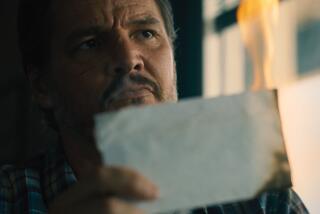‘Crooklyn’ Not All Joys in the Hood
- Share via
In “Crooklyn,” a jazz musician and a teacher struggle to get ahead and get along while raising five rowdy children in the diverse Bedford-Stuyvesant section of Brooklyn in the ‘70s--a time when “AfricanAmerican children were motivated primarily by two things: television and sugar.” (Rated PG-13)
*
Once upon a time, say 20 years ago, urban kids were allowed to play outside on the street. The boys played board games. The girls clapped hands and chanted “Bobo-ski-watten-datten.” The little ones watched the older ones kiss under the stoop.
To kids who weren’t even born then, seeing the wild mix of ‘70s artifacts--”Partridge Family” television shows, Afro hairdos and bell-bottom pants--is something of a history lesson.
“I didn’t know that much about the ‘70s,” said Brandon Arant, 13. “When I saw it, I thought it was probably fun--how everybody acted.”
The film, written by Spike Lee with his siblings and based loosely on their childhoods, features a mother, Carolyn, some might find familiar today: She resents having to do all the housework in addition to her job, won’t allow TV on a school night and wants you to finish what’s on your plate. (“Pick up the fork and eat the peas! Now!”) The father emits bodily noises at the table, wants respect and wants to be his own man.
The kids fall into generic types: the oldest who’s supposed to set the example, the chubby one, the accident-prone one, the lone girl who takes up the housework when her mother is unable and the baby. They quickly learn lessons of the neighborhood: Stay away from the guys sniffing glue from a paper bag.
But despite the style and energy of the ‘70s, it was rarely fun outside or inside the Carmichaels’ brownstone. Carolyn might wake them up with slaps and orders to do housework. When they won’t turn off the TV, she gets physical with the kids, then the father gets physical with her, and it ends in a melee on the stairs. She throws him out, but he returns the next day with roses and they start all over.
The children’s insults are honed from the banal (“You’re stupid. I hate you. Idiot.”) to the more ornate (“Shut up, you evil, flat-chested wench.”) They are free with the N-word and taunt the gay man who lives downstairs.
The way the family treated one another was “not too good,” Brandon said. All things considered, he figured it’s probably more fun in the ‘90s. Family members tend to be more respectful of one another now, he observed, but added that he thought some people treat homosexuals even worse than was shown in the movie.
Because of the language and the glue sniffing, Brandon wasn’t at all sure he would call this family drama a good family film. It’s realistic, and there’s clearly love and loyalty in the mix, but not many role models. He thought the rating was a little generous, and that the movie was more appropriate for 14- to 16-year-olds.
Many kids in the audience had seen other Spike Lee movies and knew this one was different.
“This one doesn’t really have to do with slaves,” said Stacy Diaz, 16. “This was an ordinary black family that was from Brooklyn, and they were like really poor.”
Tae Settle, 12, said, “I think it’s better than some of the other movies I’ve seen.” She said she identified with the daughter, Troy, and the large family. “There was only one girl and all these guys. In my family, there’s a whole bunch of girls and only one guy.”
None of the kids agreed with me that the two-hour movie was a little long and slightly pointless. But we were all touched at the end when the family pulls together.
Some, however, were left unsure about the title.
“I guess,” Stacy said, “it’s like Brooklyn, but their life was kind of crooked.”
More to Read
Only good movies
Get the Indie Focus newsletter, Mark Olsen's weekly guide to the world of cinema.
You may occasionally receive promotional content from the Los Angeles Times.










